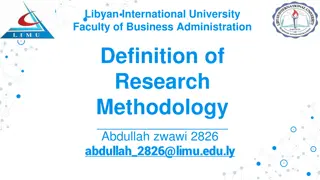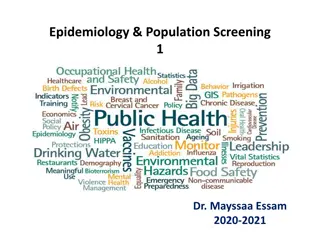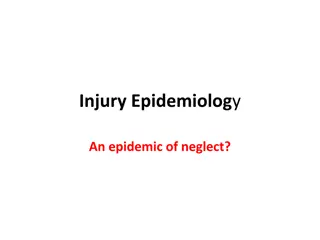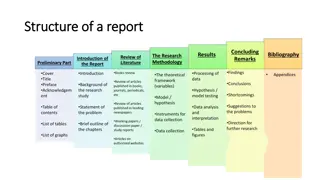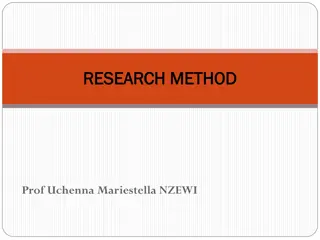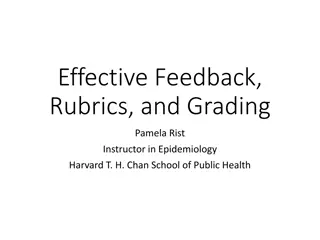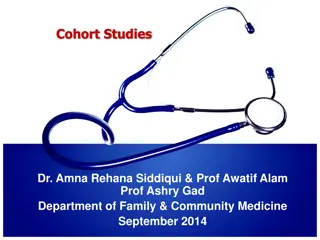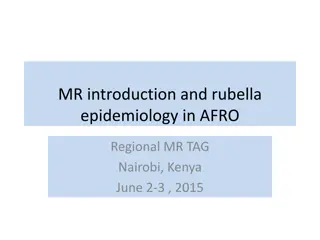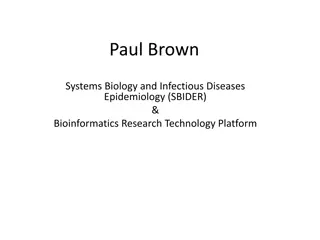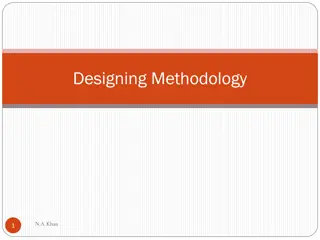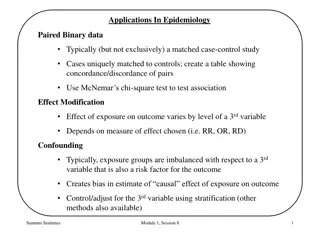Research Methodology in Epidemiology
Research Methodology is a systematic approach to gathering evidence for solving healthcare issues. Dr. Mohammed ALnaif discusses various methods used in health science, the basis of scientific methods, hypotheses, and theories related to epidemiology. The importance of clear research hypotheses and the elements of an epidemiological research question are also highlighted.
Download Presentation

Please find below an Image/Link to download the presentation.
The content on the website is provided AS IS for your information and personal use only. It may not be sold, licensed, or shared on other websites without obtaining consent from the author.If you encounter any issues during the download, it is possible that the publisher has removed the file from their server.
You are allowed to download the files provided on this website for personal or commercial use, subject to the condition that they are used lawfully. All files are the property of their respective owners.
The content on the website is provided AS IS for your information and personal use only. It may not be sold, licensed, or shared on other websites without obtaining consent from the author.
E N D
Presentation Transcript
EPIDEMIOLOGY KSU College of Applied Medical Sciences CHS 334 Epidemiology Mohammed S. Alnaif, PhD alnaif@ksu.edu.sa Dr. Mohammed ALnaif 14/10/1446 1
Research Methodology Research Methods is a systematic and principled way of obtaining evidence (data, information) for solving health care problems. Dr. Mohammed ALnaif 2 14/10/1446
Research Methodology METHODS AND KNOWLEDGE Other methods of known used in the health science: Authority Rationalism Intuition. Dr. Mohammed ALnaif 3 14/10/1446
Research Methodology Basis of scientific method: Scepticism (open to doubt and analysis) Determinism (events in the world occur according to regular laws and causes) Empiricism (enquiry ought to be conducted through observation and experiments). Dr. Mohammed ALnaif 4 14/10/1446
Research Methodology Hypotheses are propositions about relationships between variables or differences between groups that are to be tested. Dr. Mohammed ALnaif 5 14/10/1446
Epi Hypotheses 1. Studies must address clearly defined research hypotheses ( research questions ) Hypotheses must based on sound causal mechanisms in specific terms that can be tested Hypotheses are refinement as new information becomes available Hypotheses are like nets; only he who casts will catch. -- Novalis 2. 3. 6 Dr. Mohammed ALnaif 14/10/1446
Research Methodology Theories are sets of logically related or linked ideas (abstractions) about how the world or some process works. The fundamental building blocks of theory are concepts. In other words theories consist of a series of statements (propositions) about a relationships between concepts. Dr. Mohammed ALnaif 7 14/10/1446
Selected elements of an epi research question 1. Source population 2. Exposure variable (E) 3. Disease variable (D) 4. Extraneous confounding variables (C1, C2, , Ck) 5. Dose-response 6. Time-response 7. Sample size 9 Dr. Mohammed ALnaif 14/10/1446
Research Methodology A variable is simply a property that may vary from case to case. Example, a room temperature. Dr. Mohammed ALnaif 10 14/10/1446
Research Methodology Variables E D C1 C2 Ck Research question in general terms: Does exposure E cause disease D after considering the contributions of potential confounders C1, C2, , Ck? Flu Virus Age Trauma Surgery 11 Dr. Mohammed ALnaif 14/10/1446
Research Methodology Research Methodology Design (experimental or observational) Sampling (selecting a group of cases from a population) Measures (Measurement refers to the procedure of attributing qualities or quantities to specific characteristics of objects, persons or events) Intervention (if applicable) Analysis. Dr. Mohammed ALnaif 12 14/10/1446
Research Methodology Main types of epidemiologic studies Observational Studies Aggregate-level unit of observation Ecological Person-level unit of observation Cross-Sectional Longitudinal Cohort Case-Control Experimental Studies Community trials Field trials Clinical trials Dr. Mohammed ALnaif 13 14/10/1446
Research Methodology Design Elements Experimental or Observational EXPERMENTAL RESEARCH In experimental studies the intervention is under the control of the researcher. Dr. Mohammed ALnaif 14 14/10/1446
Research Methodology EXPERMENTAL RESEARCH Independent Variables: in an experiment an Independent Variable is the variable or condition manipulated or controlled by the researcher. Dependent Variables: the outcome variables are termed Dependent Variables. Dr. Mohammed ALnaif 15 14/10/1446
Research Methodology EXPERMENTAL RESEARCH The aim or goal is to determine how changes in the Independent variable affect some outcome the dependent variable. Dr. Mohammed ALnaif 16 14/10/1446
Research Methodology EXPERMENTAL RESEARCH By controlling the timing or amount of the intervention or which subjects get it and which ones do not, the chances are minimized that other factors outside of the researcher's control could have affected the results. Dr. Mohammed ALnaif 17 14/10/1446
Research Methodology Observational Studies By contrast the researcher does not control the intervention in observational studies but rather observes the effects of an experiment in nature. Dr. Mohammed ALnaif 18 14/10/1446
Research Methodology DATA GATHERING Prospective studies that involve gathering data after the study have begun. Retrospective studies the data have already been collected for other reasons at sometime in the past. Dr. Mohammed ALnaif 19 14/10/1446
Prospective, Retrospective, Am-bidirectional Based on proximity of data collection to actual events Prospective = data collected near time of event Retrospective = data are from the past ( historical data ) Am-bidirectional - combination of prospective and retrospective data 20 Dr. Mohammed ALnaif 14/10/1446
Research Methodology THE NEED FOR CONTROL OR COMPERISON GROUP A control group consist of subjects that undergo exactly the same conditions as the group receiving the treatment, the casual effect of which being investigated. In field research in applied clinical setting we include control groups in the design to ensure internal validity. Dr. Mohammed ALnaif 21 14/10/1446
Research Methodology Internal Validity In a study internal validity is the ability of the researcher to attribute differences in the groups or participants to the independent variable. Dr. Mohammed ALnaif 22 14/10/1446
Research Methodology SAMPLING Definition of the population researchers defines the population to which they wish to generalize the results. A population is an entire set of persons, objects or events which the researcher intends to study. Dr. Mohammed ALnaif 23 14/10/1446
Research Methodology SAMPLING A sample is a group of cases to be selected from a population. A Cohort is a group of people who share some attribute. Selection of the sample using an appropriate sampling method, the sample is selected from the population. Dr. Mohammed ALnaif 24 14/10/1446
Research Methodology SAMPLING A representative sample is a sample that accurately reflects the characteristics of the population from which it is drawn. Sometimes called unbiased sample. Dr. Mohammed ALnaif 25 14/10/1446
Research Methodology SAMPLING ABiased sample is one that is not representative. It does not reflect the composition of the population to which the researcher is attempting to generalize. Dr. Mohammed ALnaif 26 14/10/1446
Research Methodology SAMPLING Random sampling is one in which all members of the population have an equal chance of selection. Dr. Mohammed ALnaif 27 14/10/1446
Research Methodology SAMPLING Random sampling The procedures for drawing a random sample involves two steps: Construction of a list of all members of the population. Using a method such as dice, coins or random number tables to select randomly from the list the number of members required for the sample. Dr. Mohammed ALnaif 28 14/10/1446
Research Methodology SAMPLING Quota sampling involves a preset number of cases in each subcategory of a given population. Stratified random sampling same as quota sampling except that each quota is filled by randomly sampling from each subgroup. Dr. Mohammed ALnaif 29 14/10/1446
Research Methodology SAMPLING Area sampling is a sample taking on the basis of location of cases. Systematic sampling is working through a list of the population and choosing, say, every 10thor 20thcase for inclusion in the sample. Dr. Mohammed ALnaif 30 14/10/1446
Research Methodology SAMPLING Incidental sampling, or Haphazard sampling, or convenience sampling is the cheapest and easiest sampling method to use. However, it not necessarily biased. Dr. Mohammed ALnaif 31 14/10/1446
Research Methodology SAMPLING Optimal number of cases - Sampling error is reflected in the discrepancy between the true population parameter and the sample statistic. The greater the sample size the smaller the probability of sampling error. Dr. Mohammed ALnaif 32 14/10/1446
Research Methodology Subject Allocation Assignment of subjects into groups Assignment procedures using an assignment procedure, the participants are allocated to groups. Dr. Mohammed ALnaif 33 14/10/1446
Research Methodology Subject Allocation Random Assignment to independent groups, all subjects have the same probability of being assigned to the experimental group or the control group. Dr. Mohammed ALnaif 34 14/10/1446
Research Methodology Assignment of subjects into groups Matched groups Matched subjects are formed, that a pair of experimental and control subjects are chosen to be similar as possible in terms of certain key variables, such as age, sex, race, socioeconomic status, number of hospital admissions, or diagnosis. Dr. Mohammed ALnaif 35 14/10/1446
Research Methodology Assignment of subjects into groups Matched groups Then one member of the pair is randomly assigned to one group and the other member to the other group. This ensures that the two groups have similar characteristics. Dr. Mohammed ALnaif 36 14/10/1446
Research Methodology Assignment of subjects into groups Under matched groups If they differ on some variable that is related to the outcome of the study. Dr. Mohammed ALnaif 37 14/10/1446
Research Methodology EXTERNAL VALIDITY OF EXPERMENTS External validity refers to the extent to which the results of an investigation can be generalized to other samples or situations. Dr. Mohammed ALnaif 38 14/10/1446
Research Methodology THREATS TO VALIDITY The purpose of any study is to tell us what is really happening in the world. Does streptokinase reduce cardiac mortality? What causes sudden infant death syndrome? Dr. Mohammed ALnaif 39 14/10/1446
Research Methodology THREATS TO INTERNAL VALIDITY 1. History 2. Maturation 3. Testing 4. Instrumentation 5. Regression to the mean 6. Selection or assignment errors 7. Mortality Dr. Mohammed ALnaif 40 14/10/1446
Research Methodology THREATS TO INTERNAL VALIDITY History This refer to events that intervene between the pre-test and post test that do not form part of the treatment being investigated by the researcher Dr. Mohammed ALnaif 41 14/10/1446
Research Methodology THREATS TO INTERNAL VALIDITY Maturation In a study overtime, the patients may naturally mature. This is a particular problem with pediatric and geriatric populations. Dr. Mohammed ALnaif 42 14/10/1446
Research Methodology THREATS TO INTERNAL VALIDITY Testing The patient as a result of familiarity with the testing procedures, appear to improve spontaneously. Dr. Mohammed ALnaif 43 14/10/1446
Research Methodology THREATS TO INTERNAL VALIDITY Instrumentation During the time between measurements, the measuring instrument might change Dr. Mohammed ALnaif 44 14/10/1446
Research Methodology THREATS TO INTERNAL VALIDITY Regression to the mean Refers to the phenomenon whereby groups of subjects that are chosen because of extreme scores on any variable will have scores that are less extreme and closer to the mean value when they are retested. Dr. Mohammed ALnaif 45 14/10/1446
Research Methodology THREATS TO INTERNAL VALIDITY Selection or Assignment Errors The groups being compared may be different at the outset because of inadequate assignment or selection procedures, rather than as a result of any treatment effects. Dr. Mohammed ALnaif 46 14/10/1446
Research Methodology THREATS TO INTERNAL VALIDITY Mortality Mortality in a study refers to when a participant withdraws from the study before its completion. Dr. Mohammed ALnaif 47 14/10/1446
Research Methodology THREATS TO VALIDITY We hope that the result of our sample can be generalized to the population at large so the our findings also hold true for similar people. Consequently it is disturbing, at the least, to find different studies coming to opposite conclusions. Dr. Mohammed ALnaif 48 14/10/1446
Research Methodology THREATS TO VALIDITY Subject Selection Biases Subject selection biases involves many factors that may result in the subjects in the sample being unrepresentative of the population. Healthy workers Bias, Incident- Prevalence Volunteer Bias Dr. Mohammed ALnaif 49 14/10/1446
Research Methodology THREATS TO VALIDITY Hawthorne Effect: An effect which results in the improvement of subjects performances through being observed and/or social contact. It is the same as the Placebo effect. Dr. Mohammed ALnaif 50 14/10/1446
The Hawthorne Effect Improvements in behavior because subjects know they are being observed effects unrelated to the intervention Initially observed in industrial psychology experiments in the 1930 A comparable attention bias effect is seen in trials 51



